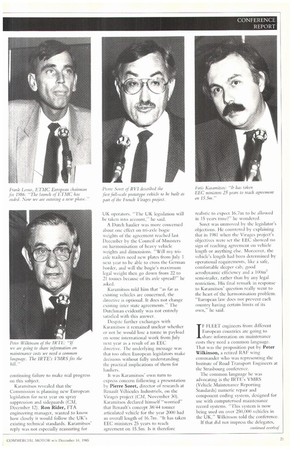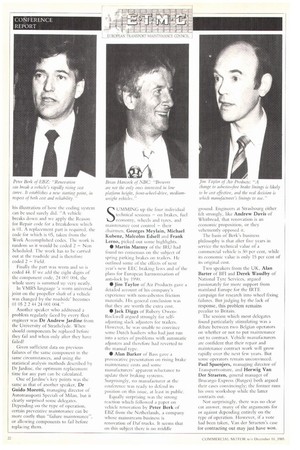DISCORD ON EEC HARMONY
Page 22

Page 23

Page 24

If you've noticed an error in this article please click here to report it so we can fix it.
Disquiet is shared by Europe's haulage industry about the EEC's failure to make any real headway on technical harmonisation for vehicles. Tim Blakemore reports from Strasbourg on a conference which marks the emergence of a new pressure group
THE EUROPEAN Transport Maintenance Council was established three years ago, largely through the efforts of Roger Denniss, director of distribution of Bass UK, to bring vehicle operators and manufacturers together to discuss problems related to vehicle and equipment maintenance. It is non-profit making and modelled on the wellestablished North American Truck Maintenance Councils.
The first two ETMC annual conferences, in Brussels in 1983 and Barcelona last year, brought a mixture of praise for the principle, but criticism by delegates of sonic of the conference content.
"l 'his year the ETMC organisers have heeded their critics. Last year's complaints were of too few serious technical sessions, unsatisfactory replies by some manufacturers to specific questions, and not enough operator involvement in the conference, particularly from France and West Germany. This year's venue, Strasbourg, was chosen mainly to attract more support Irons the French and Germans, and in that it at least partly succeeded. Also, there were more technical sessions this time, and the 34 sponsoring manufacturing companies were pvessed a little harder during question time — hut still not hard enough to satisfy some delegates. They complained of too many question sessions having to be cut short to accommodate an over-full programme which included sonic unnecessary, basic subjects.
There were fresh criticisms too, like that from Barry Jennings of British Gas, who noted that topics of interest to operators of light vehicles were almost completely overlooked. Despite these criticisms, and a lower attendance than last year (there were 462 delegates, about 25 per cent of them operators), the newly elected chairman of ETMC, Frank Lerno of the Belgian tanker transport company, Transport Coulter, clearly has no doubt about the success of the 1985 conference.
In his closing address, in which he demonstrated some remarkable linguistic ability by freely switching from French to German to Dutch and to English, he described the conference as marking 'the end of the launching period of ETMC. Now we are entering a new phase.''
THAT new phase could include an important role for ETMC as a pressure group to get across the views of fleet managers and engineers to those who formulate European transport legislation. Such people might include Fotis Karamitsos from the EEC Commission's directorate-general for transport who was one of the principal speakers in Strasbourg. His paper was on "technical harmonisation in the fields of transport and vehicles". The
questions and comment which followed it made it plain that if there is one sentiment shared by fleet engineers on both sides of the Channel, it is a growing impatience with the EEC's continuing failure to make real progress on this subject.
Karamitsos revealed that the Commission is planning new European legislation for next year on spray suppression and sideguards (CM, December 12). Ron Rider, FTA engineering manager, wanted to know how closely it would follow the UK's existing technical standards. Karamitsos' reply was not especially reassuring for
UK operators. "The UK legislation will be taken into account," he said.
A Dutch haulier was more concerned about one effect on tri-axle bogie weights of the agreement reached last December by the Council of Ministers on harmonisation of heavy vehicle weights and dimensions. "Will my triaxle trailers need new plates from July 1 next year to be able to Cross the German border, and will the bogie's maximum legal weight then go down from 22 to 21 tonnes because of its axle spread?" he asked.
Karamitsos told him that "as far as existing vehicles arc concerned, the directive is optional. It does not change existing inter state agreements." The Dutchman evidently was not entirely satisfied with this answer.
Despite further exchanges with Karamitsos it remained unclear whether or not he would lose a tonne in payload on some international work from July next year as a result of an EEC directive. The underlying message was that too often European legislators make decisions without fully understanding die practical implications of them for hauliers.
It was Karamitsos' own turn to express concern following a presentation by Pierre Soret, director of research at Renault Whicules Industriels, on the Virages project (CM, November 30). Karamitsos declared himself "worried" that Renault's concept 38/44 minter articulated vehicle for the year 2000 had an overall length of 16.7m. "It has taken EEC ministers 25 years to reach agreement on 15.5m. Is it therefore
realistic to expect 16.7m to be allowed in 15 years time?" he wondered.
Soret was unmoved by the legislator's objections. He countered by explaining that in 1981 when the Virages project's objectives were set the EEC showed no sign of reaching agreement on vehicle length or anything else. Moreover, the vehicle's length had been determined by operational requirements, like a safe, comfortable sleeper cab, good aerodynamic efficiency and a 100m3 semi-trailer, rather than by any legal restriction. His final remark in response to Karamitsos' question really went to the heart of the harmonisation problem. "European law does not prevent each country having certain limits of its own," he said.
/F FLEET engineers from different European countries are going to share information on maintenance costs they need a common language. That was the proposition put by Peter Wilkinson, a retired RAF wing commander who was representing the Institute of Road Transport Engineers at the Strasbourg conference.
The common language he was advocating is the IRTE's VMRS (Vehicle Maintenance Reporting Standards) numeric repair and component coding system, designed for usc with computerised maintenance record systems. "This system is now being used on over 250,000 vehicles in the UK," Wilkinson told the conference.
If that did not impress the delegates, his illustration of how the coding system can be used surely did. "A vehicle breaks down and we apply the Reason for Repair code for a breakdown which is 01. A replacement part is required, the code for which is 05, taken from the Work Accomplished codes. The work is random so it would be coded 2 — Non Scheduled. The work has to be carried out at the roadside and is therefore coded 2 — Field.
Finally the part was worn and so is coded 44. If we add the eight digits of the component code, 24 001 004, the whole story is summed up very neatly.
In VMRS language 'a worn universal joint on the propeller shaft of a vehicle was changed by the roadside' becomes 01 05 2 2 44 24 001 004."
Another speaker who addressed a problem regularly faced by every fleet engineer was Dr Andrew Jardine from the University of Strathclyde. When should components be replaced befOre they fail and when only after they have failed?
Given sufficient data on previous failures of the same component in the same circumstances, and using the statistical analysis methods described by Dr Jardine, the optimum replacement time for any part can be calculated.
One of Jardine's key points was the same as that of another speaker, Dr Guido Moretti, managing director of Autotransporti Speciali of Milan. but it clearly surprised sonic delegates. Depending on the type of operation, certain preventive maintenance can be more costly than "failure maintenance-, or allowing components to fail before replacing them. SUMMING up the four individual technical sessions — on brakes, fuel economy, wheels and tyres, and maintenance cost control — their chairmen, Georges Meylain, Michael Kubenz, Malcolm Edsell and Frank Lerno, picked out sonic highlights.
• Martin Marmy of the IIW had found no consensus on the subject of spring parking brakes on trailers. He outlined sonic of the effects of next year's new EEC braking laws and of the plans for European harmonisation of anti-lock by 1990.
• Jim Taylor of Air Products gave a detailed account of his company's experience with non-asbestos friction materials. His general conclusion was that they are worth the extra cost.
• Jack Diggs of Rubery OwenRock well argued strongly for selfadjusting slack adjusters for trailers. However, he was unable to convince some Dutch hauliers who had just run into a series of problems with automatic adjusters and therefore had reverted to the manual type.
• Alan Barker of Bass gave a provocative presentation on rising brake maintenance costs and sonic manufacturers' apparent reluctance to update their braking systems. Surprisingly, no manufacturer at the conference was ready to defend its position on this issue, at least in public.
Equally surprising was the strong reaction which followed a paper on vehicle renovation by Peter Berk of EBZ from the Netherlands, a company whose mainstream business is renovation of Dar trucks. It seems that on this subject there is no middle ground. Engineers at Strasbourg either felt strongly, like Andrew Davis of Whitbread, that renovation is an economic proposition, or they vehemently opposed it.
The basis of Berk's business philosophy is that after five years in service the technical value of a commercial vehicle is 50 per cent, while its economic value is only 15 per cent of its original cost.
Two speakers from the UK, Alan Barter of BFI and Derek Waudby of National Tyre Services, argued passionately for more support from mainland Europe for the IRTE
campaign for research into wheel fixing failures. But judging by the lack of response, this problem remains peculiar to Britain.
The session which most delegates found particularly stimulating was a debate between two Belgian operators on whether or not to put maintenance out to contract. Vehicle manufacturers are confident that their repair and maintenance contract work will grow rapidly over the next few years. But sonic operators remain unconvinced. Paul Spacnjers, managing director of Transportvoiture, and Herwig Van Der Straeten, general manager of Brucargo Express (Rutges) both argued their cases convincingly; the former runs his own workshop while the latter contracts out.
Not surprisingly, there was no clear cut answer, many of the arguments for or against depending entirely on the type of operation. However, if a vote had been taken, Van der Straeten's case for contracting out may just have won.




































































































